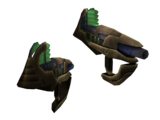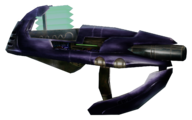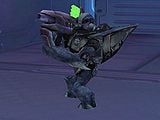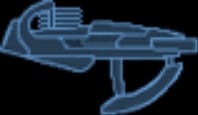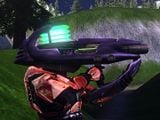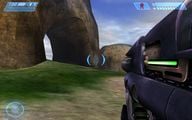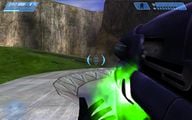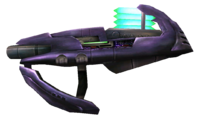Zasqi-pattern fuel rod gun
From Halopedia, the Halo wiki
| Zasqi-pattern flak launcher | |
|---|---|
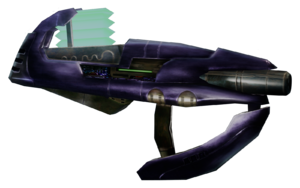
| |
| Production overview | |
|
Manufacturer: |
|
| Specifications | |
|
Length: |
68.7 inches (174 cm)[1] |
|
Ammunition type: |
|
|
Feed system: |
Battery-powered |
| Service history | |
|
In service: |
|
The Zasqi-pattern flak launcher[1] is a type of fuel rod gun that was in service within the Covenant's Fleet of Particular Justice in September 2552. It is a shoulder-mounted, battery-powered weapon which fires fuel rods, and was often carried by Spec-Ops Unggoy during the later stages of the Battle of Installation 04.[2][3]
Overview
Performance
The Zasqi-pattern fuel rod gun is a powerful, shoulder-mounted infantry weapon which fires explosive fuel rod ammunition, similar to vehicle-mounted weapons such as the fuel rod cannon, but which have a very pronounced downward arc. Unlike other fuel rod gun models such as the Type-33 and Type-58, the Zasqi-pattern design draws from a battery reserve, instead of a physical magazine. As such, it is subject to the same limitations as other Covenant battery-powered weaponry: notably, it will overheat if fired rapidly for too long, and it cannot easily be recharged on the battlefield.[4]
Some versions of this weapon were known to be equipped with a failsafe "dead man's switch", which caused the weapon’s breach-pin to detonate the remaining ammunition if its wielder was killed in combat, rendering the weapon inoperable and useless and potentially damaging any enemies - or allies - nearby.[2] This was common for other types of fuel rod gun too, such as the Type-33.[5][6] However, the concept was phased out by the Covenant in late 2552.[6]
History
The weapon was commonly seen wielded by Spec-Ops Unggoy during the Battle of Installation 04, particularly during the later stages after the release of the Flood.[2] Rtas 'Vadumee's strike team included Spec-Ops Grunts wielding the weapon during his mission to the Infinite Succor which took place concurrently.[3]
Variants
- There is a gold version of the fuel rod gun was used during the Battle of Installation 04.[2]
- There is a purple version of the fuel rod gun which was used among Rtas 'Vadumee's strike team during the Skirmish on Infinite Succor.[3]
Gameplay
Halo: Combat Evolved
In the Xbox version of Halo: Combat Evolved, the weapon is unusable; being exclusive to special red Grunts (in Halo: Combat Evolved Anniversary these Grunts wear masks) and Spec-Ops Grunt enemies in the campaign. When in use, the Grunts need to charge the weapon to fire it. And when the weapon is dropped, it explodes, causing damage to anything near it, and can trigger grenade explosions if there were grenades littered inside blast radius. This version of the weapon is gold, but the texture of the weapon makes it look pink in dark areas. In Halo: Combat Evolved Anniversary, this Fuel Rod Gun was changed into the design of the Type-33 fuel rod gun.
In the PC port there is a unique version of the weapon exclusive to multiplayer, it is a battery-operated weapon, and can fire a total of 28 rounds, from its 100 battery unit charge. If fired at its maximum fire rate, it could shoot five rounds each before overheating. Unlike the campaign version of the weapon, it does not explode when dropped by players and does not need to be charged to be fired. This version of the weapon is purple, and has four silver vents at the side of it. This version of the weapon does not replace the one in the campaign.
Trivia

|
Browse more images in this article's gallery page. |
- In Halo PC multiplayer, the weapon's barrel retracts into the weapon when fired. Whether this is the firing mechanism or a recoil compensator is unknown, but the weapon has very little recoil on the hands of the player character, supporting the latter.
- The fuel rod gun was originally meant to be a grenade launcher, but it was changed to a Covenant rocket launcher. It can be viewed on this video.
Gallery
A Special Operations Unggoy with a fuel rod gun in Halo: Combat Evolved.
A fuel rod gun schematic as seen in Halo: Combat Evolved.
A Spartan with a fuel rod gun in Halo: Combat Evolved for PC Multiplayer.
List of appearances
- Halo: Combat Evolved (First appearance)
- Halo Graphic Novel
- Halo: Uprising
- Halo: Fall of Reach
Sources
- ^ a b c d Halo Encyclopedia (2022 edition), page 299
- ^ a b c d Halo: Combat Evolved, Campaign
- ^ a b c Halo Graphic Novel - The Last Voyage of the Infinite Succor
- ^ Halo: Combat Evolved for PC, Multiplayer
- ^ Halo: Combat Evolved Anniversary, Campaign
- ^ a b Bungie.net, Type-33 Light Anti-Armor Weapon (Retrieved on Jun 1, 2020) [archive]
| ||||||||||||||||||||
